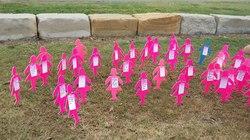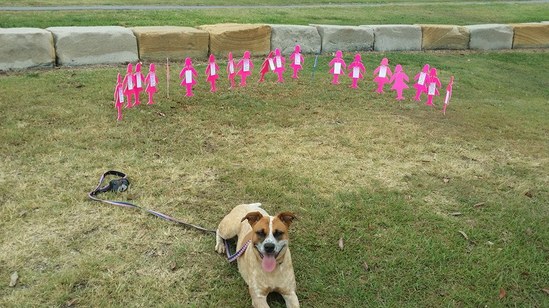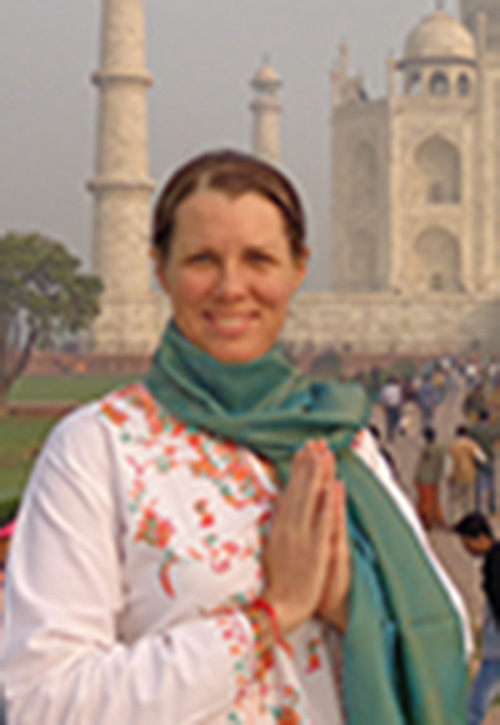
The field of women is the brain child of Lyn Swinburne who in 1998 saw her first Field of Women come to reality on the lawns of Parliament House in Canberra. The Pink Silhouettes Ladies which are now synonymous with Breast Cancer Network of Australia (BCNA) represents the number of women diagnosed with Breast Cancer every year. Lyn saw the field of women as a powerful message of the way that breast cancer can bring together all those affected to form a strong movement of support, hope and encouragement.
My tribute is a reflection of my thoughts relevant for ALL women who may be struggling through life in general. Breast Cancer to me is a just one symptom of the nature of women (and men) to constantly put others first. As mothers, nurturers and heart givers we seem to always be in the service of others. Our own personal needs come second – even third, fourth, tenth and in some cases completely forgotten until suddenly pain becomes so unbearable that we decide to get that lump checked.
Having reflected recently on many conversations with other women affected by breast cancer I realise this is a real epidemic. One friend recently commented on her diagnosis. It took her 6 months to get to her doctor for follow up after finding her initial lump because she was too busy working. I remember a similar story of a beautiful woman who influenced my childhood and who died from secondary breast cancer. With raising her children and running a business she ignored the growing lump in her breast until eventually it had spread to other parts of her body and she could no longer ignore the pain that came with bone degeneration. I mention these courageous women not to judge or criticise but to highlight the attitude of women everywhere. These are not isolated stories. These women are not unintelligent women. These women are what I would call overloaded by the mother archetype.
There can be many manifestations of the mother archetype. The one I am mostly referring to is the mother that puts everyone first. She is the nurturer, the giver, the protector, creator, rescuer, the unconditional carer, and lover, the self-less hero, warrior and tribune. For the record, in my opinion the mother archetype is not limited to women. Men also have this archetype and are just at risk of the “mother overload” symptoms as much as women.
Often disease processes in men manifest differently due to different archetypal patterns. Prostate Cancer was the mostly commonly diagnosed cancer in 2012 and accounted for the 2nd highest number of deaths from cancer in 2013. The rate of testicular cancer in young males is on the rise with 780 men diagnosed in 2015 and according to statistics from the Australian Government Cancer Australia website it is predicted 795 men will be diagnosed in 2016. More women are diagnosed with Breast cancer but it is predicted that 150 men will be diagnosed with breast cancer in 2016. So blokes should be aware of the “mother overload” too.
This phenomenon of the mother overload has infiltrated our society to affect both men and women. It is a syndrome of behaviour that when out of balance manifests as a red flag of disease in our physical body. Our own needs left unchecked results in the psychosomatic response of cancer. In my own case I am totally convinced that the development of abnormal cells in my own breasts were the early warnings for me to deal with some unchecked emotions around the archetype of mother. It is an ongoing process of coming to terms with it but learning to nurture myself first and put my needs of caring and loving myself is a big part of ensuring complete healing and even prevention of this disease returning. For me I had early breast cancer and was able to surgically remove the physical disease from my body completely without having to have chemo or radiation. I feel blessed in this way. Sure I had to have my boob removed to do this but it gave me opportunity to rest, reflect about the important things in life and re-evaluate my way of thinking. I like to think I used my time wisely although this is still a work in motion. A constant ebb and flow of seeking balance. But why should we wait for disease to hit us before we seek that balance?
Regardless of the psychosomatic link to breast cancer the fact that many women fail to detect changes in their boobs early signifies that this syndrome of the “mother overload” is endemic through our society. There is an imbalance between caring for or doing things for others and nurturing and doing things for ourselves.
So what is the answer to bringing our lives back to balance? Well the answer I think lies in Lyn Swinburne’s idea of the Field of Women. Bring back the sense of strong community spirit of supporting each other.
Strong Warrior women can stand together and hold each other up! We can stand strong as a united community of warrior women and we can not only fight this disease but we can prevent it. We do not have to wait for a diagnosis of breast cancer to do that. We can empower each other every single day of the week. Speak kindly, move with compassion, release all judgement of one another and live with purpose from our hearts.
The saying it takes a community to raise a child has its roots in a culture and community that knew supporting each other is a healthy way to live. But we don’t have to be a community on our own. In fact community is not singular, it means many people. So how about we add a few new sayings to our own repertoire – “Put yourself first”; “Ask for support when you need it”; and “There is more to life”. Maybe all of us mothers can learn from all of these and really kick cancer in the butt by being our own best mothers. It is time to look after you - time to realise you count in this world as a strong warrior woman supported by others. Find balance within that mother archetype you embody. Put yourself first and indulge in something you love doing. But if you feel uncomfortable doing that put yourself first for a change and get your boobs checked. Early detection can save your life.
References
Australian Government, Cancer Australia 2016 https://canceraustralia.gov.au/
BCNA, 2014 History of the Field, http://www.fieldofwomen.org.au/history-of-the-field/




 RSS Feed
RSS Feed